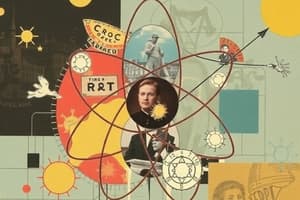Podcast
Questions and Answers
What does Dalton's Atomic Theory assert about matter?
What does Dalton's Atomic Theory assert about matter?
- Matter can be created or destroyed.
- Matter is composed of small indivisible particles called atoms. (correct)
- All atoms of an element have different charges.
- Matter is primarily made of energy.
What particles are found in the nucleus of an atom?
What particles are found in the nucleus of an atom?
- Protons and electrons
- Neutrons and mesons
- Electrons and neutrons
- Protons and neutrons (correct)
How is a chemical element uniquely identified?
How is a chemical element uniquely identified?
- By the number of neutrons
- By its charge
- By its atomic number (correct)
- By its mass number
What distinguishes a pure substance from a mixture?
What distinguishes a pure substance from a mixture?
Which of the following describes a physical property?
Which of the following describes a physical property?
What is true about energy in a chemical process?
What is true about energy in a chemical process?
Which of the following best describes isotopes?
Which of the following best describes isotopes?
What occurs during an exergonic reaction?
What occurs during an exergonic reaction?
Flashcards
Atom
Atom
The smallest unit of an element that retains the chemical properties of that element.
Dalton's Atomic Theory
Dalton's Atomic Theory
A theory stating that all matter is composed of tiny, indivisible particles called atoms.
Proton
Proton
A positively charged particle found in the nucleus of an atom.
Electron
Electron
Signup and view all the flashcards
Neutron
Neutron
Signup and view all the flashcards
Nucleus
Nucleus
Signup and view all the flashcards
Element
Element
Signup and view all the flashcards
Isotopes
Isotopes
Signup and view all the flashcards
Study Notes
Atomic Theory
- Atoms are the fundamental building blocks of matter
- Dalton's Atomic Theory provided early evidence of atoms
Atomic Building Blocks
- Atoms consist of protons (positive charge), electrons (negative charge), and neutrons (no charge)
- Protons and neutrons are in the atom's nucleus
- Electrons orbit the nucleus
Elements and Nuclides
- Elements are identified by their atomic number (number of protons)
- All atoms of an element have the same number of protons
- Isotopes are nuclides of an element with different numbers of neutrons
- Each nuclide has a specific atomic number and mass number
Substances and Mixtures
- Matter can be classified into pure substances (elements and compounds) and mixtures
- Pure substances have a fixed ratio of atoms
- Elements contain only one type of atom
- Compounds contain two or more types of atoms
- Mixtures can be homogeneous or heterogeneous
- Homogeneous mixtures have uniform composition
- Heterogeneous mixtures show visible differences in composition
Physical and Chemical Properties
- Substances have physical and chemical properties
- Physical properties can be observed without altering the substance's identity
- Chemical properties describe how a substance reacts with other substances, changing its identity
Energy
- Energy is the ability to do work
- Energy can be converted from one form to another
- Energy can be stored in atomic configurations (chemical energy) or associated with motion (thermal energy)
- Exothermic processes release heat
- Endothermic processes absorb heat
- Exergonic processes release energy
- Endergonic processes require energy input
Studying That Suits You
Use AI to generate personalized quizzes and flashcards to suit your learning preferences.




